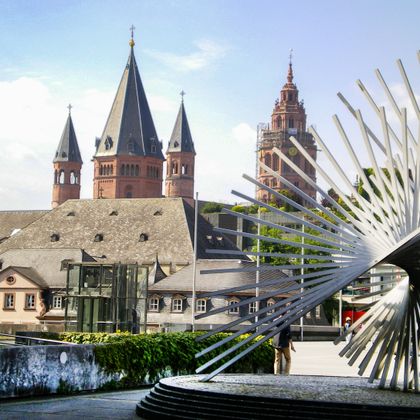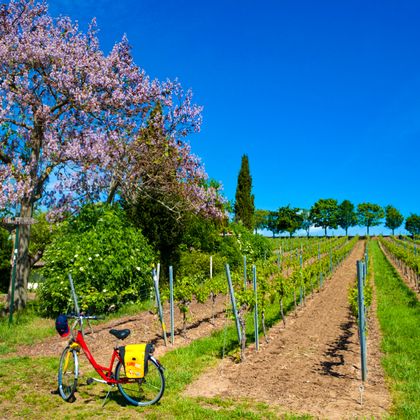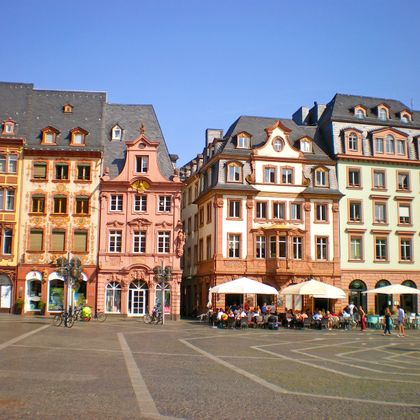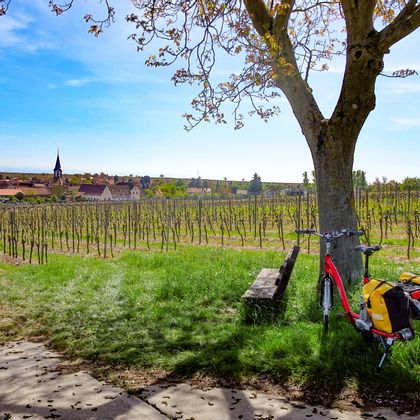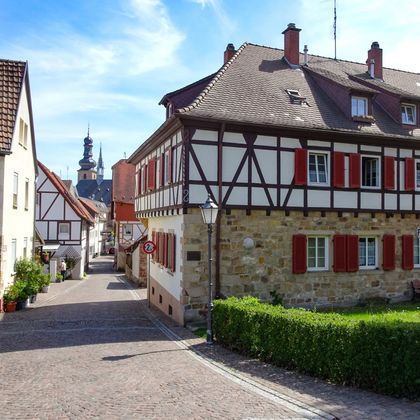Tour
Look forward to Strasbourg, the capital of Alsace with its many canals. Take an informative boat tour, stroll to Strasbourg Cathedral, the city's landmark, and through the picturesque tanners' quarter with its historic half-timbered houses. In the evening, marvel at the half-timbered Maison Kammerzell (1427), which now houses a restaurant.
Through the gentle Rhine valley you comfortably cycle on the Rhine cycle path through small villages, along dam roads, small streets, through green meadows and along small lakes to Rastatt with its baroque old town. Marvel at the residential palace, the oldest baroque residence on the Upper Rhine, and visit Castle Favorite with its museum treasures.
Along the old branches of the Rhine (Altrheinarm) you cycle through seemingly untouched nature. Look forward to the old fortified town of Germersheim with its many beautiful streets and squares. Be amazed by the massive walls of the fortress and the many historic buildings. Enjoy the Mediterranean flair of the city in one of the cozy cafés and dive into the culinary world of the fortress city in the evening.
The Rhine will take you to Speyer today. Look forward to the imperial cathedral of Speyer (UNESCO World Cultural Heritage since 1981) and Schwetzingen. You will be amazed at the famous ensemble of the castle and the castle garden in the heart of the city. Just when you have left Schwetzingen, a new highlight awaits you. Visible from a distance, world-famous and the epitome of German romanticism: the castle ruins of the Heidelberg Castle tower majestically above the old town. Cycle over the famous Heidelberg sandstone bridge, take the mountain railway up to the castle ruins and stroll through the winding streets of the old town.
Along the Neckar you cycle to the old Roman town Ladenburg with many colorful half-timbered houses (15th-18th century) and imposing remains of the medieval city wall. Afterwards, you will be able to continue your journey through the Rhine valley to the Nibelungenstadt Worms. Visit the Romanesque emperor's cathedral, the oldest Jewish cemetery in Europe, the synagogue in the old town, the Luther monument which is one of the largest reformation monuments in the world and let the evening end at the Rhine promenade.
Follow the Rhine cycle path through meadows, forests, wide fields and along the old branches of the Rhine. Slowly but surely the wine growing is getting closer and closer. No wonder, because Nierstein is the largest wine-growing community in Rhinehessen. Enjoy the historic village center, romantic wine taverns, ostrich farms, wine taverns, the medieval market square and the old Fronhof.
Immediately after Nierstein the cycle path leads into the vineyards. Let your gaze wander over the Rhine valley, marvel at the steeply rising vineyards and the great stream as the lifeblood of this region. Directly on the banks of the Rhine you will cycle on the Rhine cycle route till the center of Mainz. Visit the Roman-Germanic Central Museum, the Gutenberg Museum, the Imperial Cathedral, the Elector's Palace and St. Stephan's Church. Tourists from all over the world make their way up to the Stephansberg, to see the blue luminous glass windows of the artist Marc Chagall.
After breakfast, your wonderful cycling tour ends at the hotel in Mainz. If you would like to explore Mainz and the Rhine further, we will be happy to book additional nights for you.
MAP
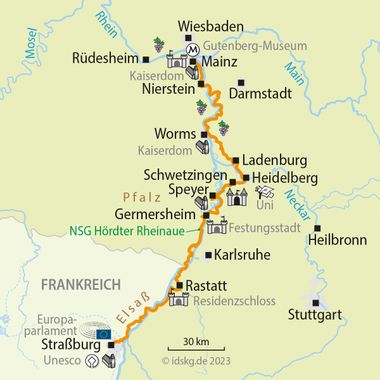
Prices / Dates
Services / Info
- Accommodation incl. breakfast
Cat. A: 3- and 4-star hotels
Cat. B: hotels and inns at 3-star level - Room with shower/bath/WC
- Luggage transport
- Personal tour information
- Digital route guidance via smartphone app
- Tips for tour preparation
- Touristic information
- 7 days hotline service
Below you will find specific information about the Rhine bike trail Straßburg to Mainz. If you have further questions about this trip, you simply call us: Phone: 06421 – 886890.
Arrival by train
Straßburg is easily accessible from all major cities in Germany by train. We recommend to take a taxi from the station to get to our partner hotels in Strasbourg.
Train schedule information
Parking facilities in Straßburg
Public parking is possible for 20,00 EUR per day and car. Reservations are not possible, payment is due on site.
Detailed information on parking at your hotel, you will receive together with the detailed travel documents two weeks prior to departure.
Condition of cycle paths
The Rhine bike path, which is mostly well-developed and flat route guidance, easy for everyone to cycle. Longer sections lead also on gravel roads through the Rheinauen.
Available rental bikes
21-speed touring bikes with derailleur gears and electric bikes are available.
Transfer back to the starting point of the journey
Saturdays in the morning there is the possibility to transfer back to Straßburg with a small bus (with bike trailer). The driver comes to pick you up at your hotel and has much room for you, your luggage and required your own bicycle.
Extra costs which are not included in the price
A possible tourist tax and charging fees for bicycle batteries are also not included in the tour price and must therefore be paid at the hotel on site.
The ferry boat trips in Neuburg and Nierstein are payable locally (approx. 3,00 EUR per person and ferry incl. bike).
7 day hotline service
Just in case the bike chain breaks, flooding makes it impossible to continue your tour or any other nasty surprise: You can reach us seven days a week and we will do anything to help you as fast as possible.
Passport and visa requirements
For EU citizens, there are no special passport or visa requirements and no health formalities to be considered for this trip.
Travel insurance
The tour price already includes the statutory insolvency insurance. In addition, we recommend that you take out travel cancellation insurance upon receipt of your travel confirmation in order to protect yourself against financial disadvantages in the event of travel cancellation, interruption of travel, illness or accident.
For this trip, we recommend using digital travel documents in the spirit of sustainability. However, you can still select printed travel documents with a cycling map during the booking process if you wish.
Please note that prices may vary depending on your selection.

I provide you with advice and assistance
Steffi Groß
